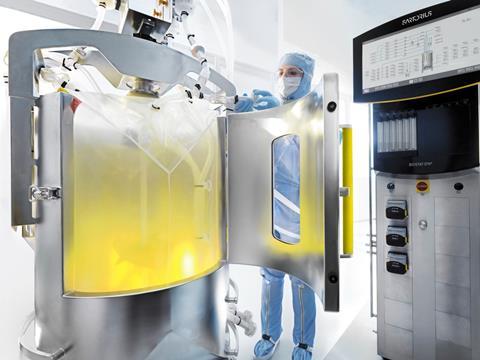
A value chain partnership has developed sterile bioprocessing bags manufactured by Sartorius using Südpack polymer films made from Dow resins, with the aim of supporting the global supply of COVID-19 vaccines.
The collaboration has allowed the companies to produce 3D flexile bags, which the companies claim are sterile and ready to use solutions designed for biopharmaceutical supplies. The bags therefore act as a single-use solution for in-process fluid handling, storage, and shipping of biologic medicine.
According to the companies, the sterile bio-reactor bags, offered with a capacity of up to 2,000 litres, are made from multi-layer films engineered for highly efficient mixing and high oxygen transfer. This is apparently ideal for mammalian cell cultures, which refers to processes that demand a high cell density or are microcarrier based.
Under precisely defined conditions in bio-reactors, cells reportedly produce the agent needed to make coronavirus vaccines. Sartorius says that its technology supports pharmaceutical companies in the cultivation and production of current vaccines and emerging vaccine technologies.
Südpack is one of Sartorius’ partners for polymer films, which are required in bio-reactors to support the reproductive growth behaviour of sensitive cell lines. Cell viability and density are important factors in reducing the risk of batch loss or inconsistencies, allowing for high product purity and improved productivity.
Südpack says that its innovative technology, research and development process, and hygiene and quality standards provide a flexible solution to meet the fast-changing requirements of the pharmaceutical industry, especially during the COVID-19 pandemic relief effort. The multi-layer polymer films are made from Dow resins.
Thomas Freis, managing director at Südpack Medica AG, comments: “With our excellent film robustness it is possible to develop, control and scale-up the highly sensitive biopharma processes on a global level.
“These multilayer films have been a fundamental part of the value chain for the production of single-use bio-reactors and have therefore enabled the scalability and accelerated development of the mRNA technology.
“Thus, we at Südpack Medica are extremely proud to be an integral part of the global fight against the COVID-19 pandemic and are aware of our responsibility coming along with.”
Günther van de Rijt, head of procurement, supply network & logistics BPS at Sartorius, adds: “Since we are helping our customers with our technologies to enable large-scale manufacture of vaccines, many of our products play an essential role in helping to overcome the pandemic.
“Therefore, it is crucial for our customers that we ensure our delivery capability. In this challenging situation, with supply chains temporarily under strain, we are particularly pleased to have reliable partners like DOW and Südpack Medica at our side.”
Abby Turner, global marketing director for healthcare & hygiene business at Dow, concludes: “At Dow, we are committed to doing what we can to support the global COVID-19 vaccination effort, and feel very proud that our resins, in collaboration with each level of the value chain, are supporting the development and roll out of vaccines across the world.
“It is an impressive collective effort, from the raw materials we are producing, right through to when the vaccines are administered – there are so many companies and individuals working hard behind the scenes to support the value chain at this critical time.”
A number of companies have been integral in providing primary, secondary, and tertiary packaging solutions for the rollout of the COVID-19 vaccination effort. For example, Softbox’s reusable parcel shipper for ultra-low temperature applications has supported the delivery of the Pfizer vaccine for COVID-19, which must be stored between -90°C to -60°C, while Corning and SCHOTT’s glass vial innovations have aided its rapid production and safe storage.


















No comments yet